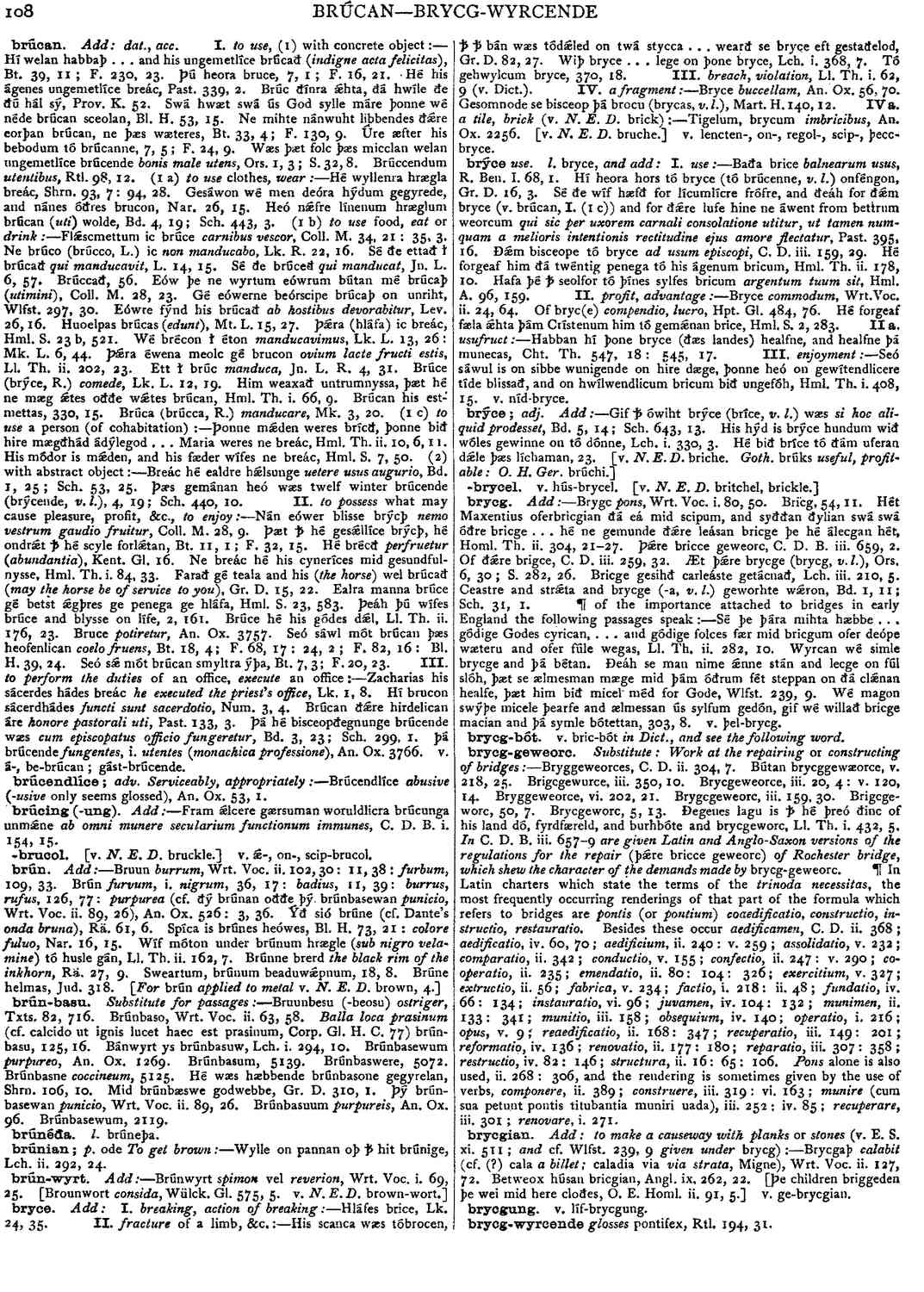brúcan
-
Hí welan habbaþ . . . and his ungemetlíce brúcað (
indigne acta felicitas
),- Bt. 39, 11; F. 230, 23.
-
Þú heora bruce,
- 7, 1; F. 16, 21.
-
Hé his ágenes ungemetlíce breác,
- Past. 339, 2.
-
Brúc ðínra ǽhta, ðá hwíle ðe ðú hál sý,
- Prov. K. 52.
-
Swá hwæt swá ús God sylle máre þonne wé néde brúcan sceolan,
- Bl. H. 53, 15.
-
Ne mihte nánwuht libbendes ðǽre eorþan brúcan, ne þæs wæteres,
- Bt. 33, 4; F. 130, 9.
-
Úre æfter his bebodum tó brúcanne,
- 7, 5 ; F. 24, 9.
-
Wæs þæt folc þæs micclan welan ungemetlíce brúcende
bonis male utens
,- Ors. 1, 3; S. 32, 8.
-
Brúccendurn utentibus, Rtl. 98, 12. (1 a) to use clothes,
wear
:-- Hé wyllenia hrægla breác,- Shrn. 93, 7: 94, 28.
-
Gesáwon wé men deóra hýdum gegyrede, and nánes óðres brucon,
- Nar. 26, 15.
-
Heó nǽfre línenum hræglum brúcan (uti) wolde, Bd. 4, 19; Sch. 443, 3. (1 b) to use food, eat or drink :-- Flǽscmettum ic brúce
carnibus vescor
,- Coll. M. 34, 21: 35, 3.
-
Ne brúco (brúcco, L.) ic
non manducabo
,- Lk. R. 22, 16.
-
Sé ðe ettað ł búcað
qui manducavit
,- L. 14, 15.
-
Sé ðe brúceð
qui manducat
,- Jn. L. 6, 57.
- Brúccað, 56.
-
Eów þe ne wyrtum eówrum bútan mé brúcaþ (
utimini
),- Coll. M. 28, 23.
-
Gé eówerne beórscipe brúcaþ on unriht,
- Wlfst. 297, 30.
-
Eówre fýnd his brúcað
ab hostibus devorabitur
,- Lev. 26, 16.
-
Huoelpas brúcas (
edunt
),- Mt. L. 15, 27.
-
Þǽ;ra (hláfa) ic breác,
- Hml. S. 23 b, 521.
-
Wé brécon ł éton
manducavimus
,- Lk. L. 13, 26: Mk. L. 6, 44.
-
Þǽ;ra éwena meolc gé brucon
ovium lacte fructi estis
,- Ll. Th. ii. 202, 23.
-
Ett ł brúc
manduca
,- Jn. L. R. 4, 31.
-
Brúce (brýce, R.)
comede
,- Lk. L. 12, 19.
-
Him weaxað untrumnyssa, þæt hé ne mæg ǽtes oððe wǽtes brúcan,
- Hml. Th. i. 66, 9.
-
Brúcan his estmettas,
- 330, 15.
-
Brúca (brúcca, R.) manducare, Mk. 3, 20. (1 c)
to use
a person (of cohabitation) :-- Þonne mǽden weres brícð, þonne bið hire mægðhád ádýlegod . . . Maria weres ne breác,- Hml. Th. ii. 10, 6, 11.
-
His módor is mǽden, and his fæder wífes ne breác,
- Hml. S. 7, 50.
-
Breác hé ealdre hǽ;lsunge
uetere usus augurio,
- Bd. 1. 25 ; Sch. 53, 25.
-
Þæs gemánan heó was twelf winter brúcende (brýcende,
v. l.
),- 4, 19; Sch. 440, 10.
-
Nán eówer blisse brýcþ
nemo vestrum gaudio fruitur
,- Coll. M. 28, 9.
-
Þæt ꝥ hé gesǽ;llíce brýcþ, hé ondrǽ;t ꝥ hé scyle forlǽ;tan,
- Bt. 11, 1; F. 32, 15.
-
Hé brécð
perfruetur (abundantia ),
- Kent. Gl. 16.
-
Ne breác hé his cyneríces mid gesundfulnysse,
- Hml. Th. i. 84, 33.
-
Farað gé teala and his (
the horse) wel brúcað (may the horse be of service to you ),
- Gr. D. 15, 22.
-
Ealra manna brúce gé betst ǽ;gþres ge penega ge hláfa,
- Hml. S. 23, 583.
-
Þeáh þú wífes brúce and blysse on lífe,
- 2, 161.
- Brúce hé his gódes dǽl. Ll. Th. ii. 176, 23.
-
Bruce
potiretur
,- An. Ox. 3757.
-
Seó sáwl mót brúcan þæs heofenlican
coelo fruens
,- Bt. 18, 4; F. 68, 17 : 24, 2 ; F. 82, 16 : Bl. H. 39, 24.
-
Seó sǽ mót brúcan smyltra ýþa,
- Bt. 7, 3; F. 20, 23.
-
Zacharias his sácerdes hádes breác
he executed the priest's office
,- Lk. 1, 8.
-
Hí brucon sácerdhádes functi sunt sacerdotio, Num. 3, 4, Brúcan ðǽre hirdelican áre
honore pastorali uti
,- Past. 133, 3.
-
Þá hé bisceopðegnunge brúcende wæs
cum episcopatus officio fungeretur
,- Bd. 3, 23; Sch. 299, 1.
-
Þá brúcende
fungentes, i. utentes (monachica professione ),
- An. Ox. 3766.
Bosworth, Joseph. “brúcan.” In An Anglo-Saxon Dictionary Online, edited by Thomas Northcote Toller, Christ Sean, and Ondřej Tichy. Prague: Faculty of Arts, Charles University, 2014. https://bosworthtoller.com/41006.
Checked: 0